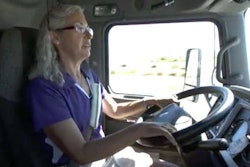Transportation Secretary Anthony Foxx took to Congress again this week — his second time in a month — to urge lawmakers to pass a long-term highway funding bill before the May 31 expiration of the current stopgap funding measure passed last year to prop up the shriveling Highway Trust Fund.
Transportation Secretary Anthony Foxx before CongressFoxx offered a brief testimony and fielded three hours of questions from the House’s Transportation and Infrastructure Committee, presenting them with a dire picture of the federal government’s current tightrope infrastructure funding game and the increasingly growing need to start planning for the coming decades.
“We don’t need to plan for 1956,” he said, hinting that the gas and diesel tax shouldn’t be the only funding option on the table. “We need to plan for 2045.”
And, while Foxx pushed his and the president’s 6-year, $478 billion Grow America plan that relies on a one-time “repatriation” tax on business’ overseas earnings, he said the administration was “all ears” to other funding mechanisms.
If Congress does not act, he said, freight corridors will become more jammed, roads and bridges already deficient will present dangers to highway users and states will continue to put more and more projects on hold due to funding uncertainty.
“We need to build new things again,” he said. “Our nation is growing by 70 million people over the next 30 years, and that growth is coming largely in the South and western part of our country. We will choke on that growth if we’re not careful.”
In the midst of the highway funding talk, however, several lawmakers took the opportunity to air their concerns to Foxx about trucking regulations, including hours-of-service rules, FMCSA’s recent expansion of cross-border trucking with Mexico, driver medical certification, an entry-level driver training rule and the Compliance Safety Accountability program.
Here’s what was said about each:
Hours-of-service: Rep. Richard Hanna (R-N.Y.) — who’s been an outspoken critic in recent years of FMCSA’s 2013 hours-of-service rule — told Foxx he was “surprised” the DOT again hired Virginia Tech’s Transportation Institute to complete the 34-hour restart study required by Congress in the 2015 government funding bill.
The bill, which suspended certain parts of hours-of-service regulations for truck operators, also requires FMCSA to complete a field study that pits old hours rules vs. the newer ones.
“One could argue to hire the company that completed a study and go back and now ask them to go back on its own study is the definition of conflict of interest,” he said. “I’d ask the DOT to go back and look at the company hired, because basically no one is going to believe what they say.”
Hanna also said he has concerns about the number of drivers participating in the study. “To have a sample set of 250 out of 2 million [drivers] — I’m not an expert, but it does not seem like nearly enough,” he said.
Foxx said he would respond in writing to Hannah after reviewing the situation.
Foxx also said truckers’ hours-of-service regulations are in line with those instituted by the DOT on airline pilots. “The DOT isn’t on inhibiting people’s rights to make a living or their freedoms,” he said. “But it is to make sure the transportation system is safe. There is science about … how much tolerance an individual has to” running counter to circadian rhythms, he said. “We have used that science in aviation and just about every mode of transportation.”
CSA: More than one member of Congress questioned Foxx about a GAO report released last year that concluded the data used in FMCSA’s Compliance Safety Accountability program suffers from quality problems and inconsistencies. The report also said the system is unfair to smaller carriers.
Rep. Rick Larsen (D-Wa.) was the first to bring up the GAO report and the trucking industry’s concerns about crash correlation with some of CSA’s Safety Measurement System BASIC scores.
“If CSA is truly meant to address safety problems before crashes occur, shouldn’t scores be based upon violations of regulations that have a causal connection to crashes?” he said. “Especially if its available to the public,” he said.
Rep. Bob Gibbs (R-Ohio) asked Foxx about the lack of crash accountability in CSA’s carrier rankings and potential determinations made about carriers by customers and insurance companies based on those crashes.
“I hear from truckers that in the CSA program they get dinged if they have an accident and it’s not their fault,” he said. “Clearly accidents sometimes are the other person’s fault. What are your thoughts on that? It seems to me that’s not right.”
Foxx said the DOT and FMCSA are “taking a look at it.” FMCSA released a report in recent weeks, however, concluding that crash accountability in CSA would be too difficult and costly to implement, as well as inconsequential to CSA scores.
Cross-border trucking: Committee ranking member Pete DeFazio (D-Ore.) — who said in January that Congress could act on FMCSA’s recent decision to open the border to all Mexican carriers — said he heard FMCSA submitted comments to the Mexican government about its concerns with carriers south of the border.
He asked Foxx to provide those comments to the committee. Entry-level driver training: In response to a question about the issue from Rep. Eleanor Holmes Norton (D-D.C.), Foxx said FMCSA expects to produce a proposed entry-level driver training rule within the 2015 calendar year.
“It’s been a long and tortured issue with a lot of false starts in the past,” Foxx said, referring to the two decades of work on the rule. “The [negotiated rulemaking] was the fastest way to get us there.”
Driver medical certification: Rep. Bob Woodall (R-Texas) questioned FMCSA’s move to establish the National Registry of Certified Medical Examiners, which went into effect in May of last year.
Woodall said one owner-operator in his district had contacted him to say that he could no longer be medically certified by the family physician he had seen “for 50 years,” and instead had to see a chiropractor who was in FMCSA’s registry.
“I cannot conceive of a scenario where I’m being certified by someone who does not know my conditions and history,” he said. “I know you’re constrained by statute in many ways, but I would welcome the opportunity to work with you,” Woodall said, referring to stipulations in 2009’s SAFETEA-LU highway funding bill that directed FMCSA to establish the registry.










